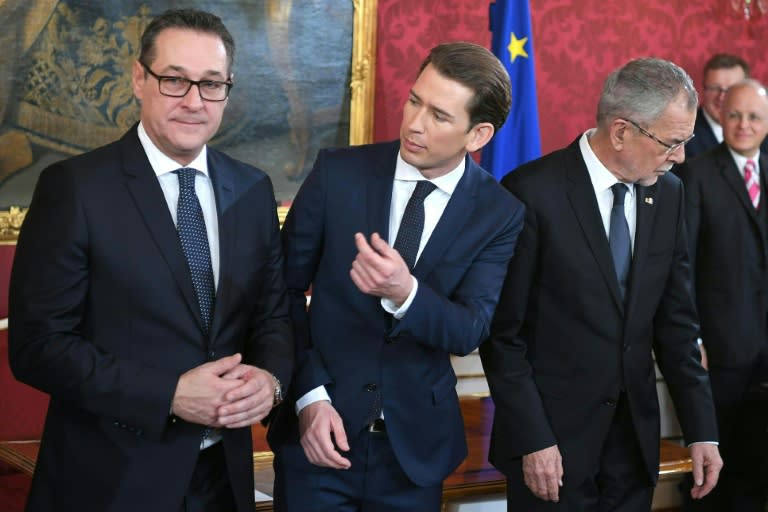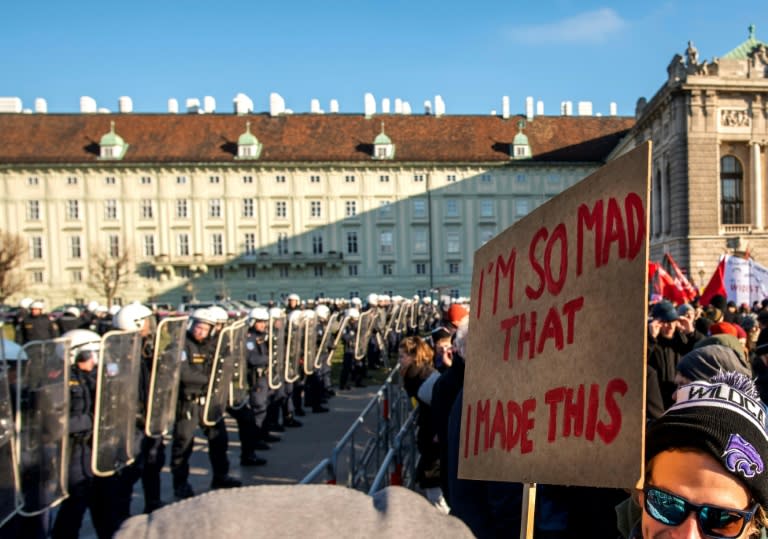Demos but no alarm for Austria's rightwing govt
With a heavy police presence keeping protestors at bay, Austria's far-right was sworn in Monday as part of the new government, rounding off a triumphant year for Europe's nationalists. However, unlike the last time the Freedom Party (FPOe) entered government, in 2000, there was next to no alarm abroad, and the demonstrations in Vienna were tiny in comparison. The coalition between the conservative People's Party (OeVP) and the FPOe has pledged to stop illegal immigration, cut taxes and resist EU centralisation, and will be led by Chancellor Sebastian Kurz of the OeVP, at 31 the world's youngest leader. His deputy is FPOe leader Heinz-Christian Strache, 48, who last year called German Chancellor Angela Merkel "the most dangerous woman in Europe" for her open-door refugee policy and has warned about the "Islamisation" of Europe. Interior minister is the FPOe's Herbert Kickl, former speechwriter for Strache's charismatic but highly controversial predecessor Joerg Haider, who was in charge of the FPOe in 2000. The party also secured the defence and foreign ministries. In an interview with public broadcaster ORF on Monday evening, Kurz said his government should be "judged on its work" and not the reputation of his coalition partners. Police told AFP that some 5,500 people took part in the largely peaceful demonstrations on Monday, where protesters brandished placards such as "refugees welcome" and "Nazis out". A heavy police presence of about 1,500 officers, with helicopters overhead and water-cannon trucks at the ready, blocked off the area around the Hofburg palace. "I am very worried," protestor Stefanie, 26, told AFP. "We saw what happened 15 years ago. The rich are favoured at the expense of the weak, the poor, refugees." President Alexander Van der Bellen called on the new government to show "respect for people who think differently, respect for the rights of minorities and support for the weakest in our society". - Bumper year - Mirroring elections elsewhere in Europe this year, both Kurz and Strache won over voters two months ago by stoking concerns about immigration after the record influx in 2015. Geert Wilders' Freedom Party became the second-largest in The Netherlands, Marine Le Pen of France's National Front was in a runoff for the presidency and Alternative for Germany entered the Bundestag. "Every election demonstrates a form of rejection of the European Union," Le Pen said in Prague on Saturday, echoing the euroscepticism shown by the FPOe in the past. Strache has called Brussels a "bureaucratic monster" and has said that Britain will "probably be better off" after it leaves the EU. Both he and Kurz emphasised however on Saturday that Vienna would stay staunchly pro-EU, ruling out a British-style referendum on EU membership. But Kurz said that during Austria's EU presidency, in the second half of 2018, Vienna would press for Brussels to be "stronger in big questions... (and to) step back on smaller issues". Austria will also "actively work" towards easing EU sanctions on Russia -- a demand of the FPOe -- and wants an end to Turkey's talks to join the bloc, sparking anger from Ankara. EU President Donald Tusk, due to meet Kurz in Brussels on Tuesday, said he expected Vienna to "continue to play a constructive and pro-European role". - 'Dangerous' - Congratulations to Kurz flooded in from abroad but unlike 17 years earlier with Haider -- when several hundred thousand people protested in Vienna -- unease was thin in the ground. One exception was UN rights chief Ra'ad Al Hussein, who told AFP that Kurz's rightwards tilt marked a "dangerous development... in the political life of Europe". He warned of the rise of a "sort of ethno-nationalism, chauvinistic nationalism" across Europe. European Commissioner Pierre Moscovici, a French left-winger, also tweeted on Sunday that the new Austrian government "requires the vigilance of democrats attached to European values". But otherwise the lack of outrage was in part due to Europe now being more inured to nationalist parties. "Eurosceptic politics is now mainstream," Nigel Farage, former head of the UK Independence Party, said on Twitter. burs-stu/jm



